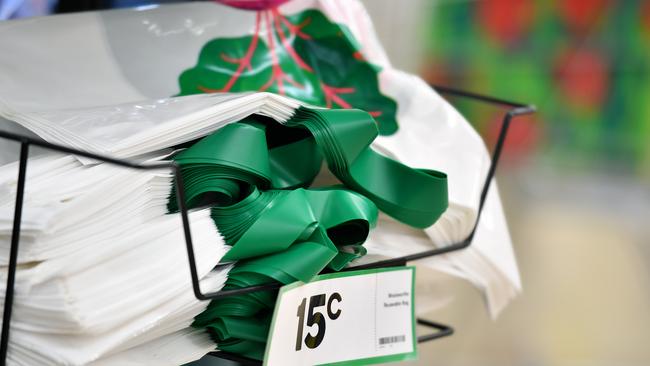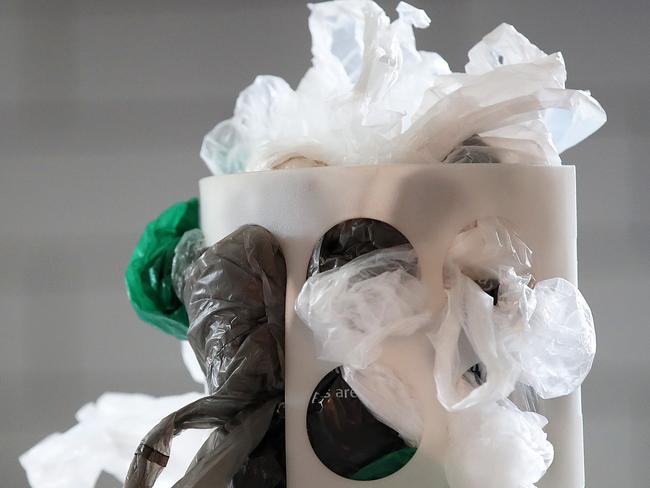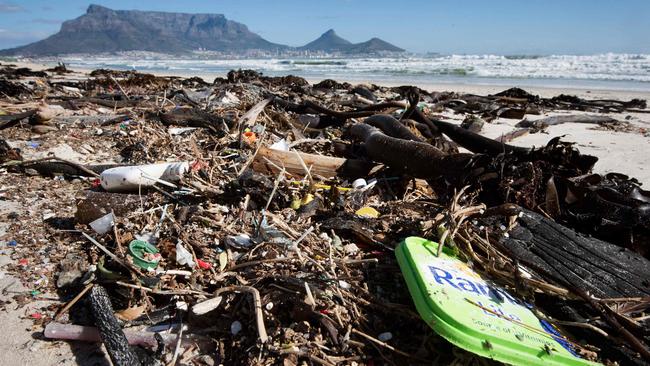Susie O’Brien: Supermarket plastic bag ban myths busted
CLIMATE-change deniers are arguing why plastic bag ban is a bad idea and predictably, there is a huge amount of misinformation peddled by those who don’t want it to work, writes Susie O’Brien.
Susie O'Brien
Don't miss out on the headlines from Susie O'Brien. Followed categories will be added to My News.
IT’S time to trash some of the myths flying around in the shopping bag ban debate. With free bags banned at many supermarkets from July 1, climate-change deniers are lining to up to argue why the phasing out of single-use plastic bags is a bad idea.
Predictably, there is a huge amount of misinformation being peddled by those who don’t want it to work. So here are some facts.
CHECKOUT WORKERS COP SERVE OVER BAG BAN
WHAT DOES VICTORIA’S PLASTIC BAG BAN MEAN FOR YOU?
A single-use plastic bag ban simply won’t work: Bans on free supermarket bags have worked well in other countries. Leading the pack is Ireland which introduced a 15c charge in 2002 which was increased to 32c five years later.
By 2012, each shopper used only 14 bags a year — down from 350. This meant plastic bags went from accounting for 5 per cent of rubbish to 0.14 per cent, according to University College Cork researchers.

Successful schemes have been run in many other countries, such as the US and UK, which saw an 85 per cent reduction in the use of single-use bags. In the UK, charging for bags led to a reduction of more than 6.5 billion bags given away in one year alone.
The fact that 70 per cent of people support the move (according to research firm Canstar Blue) means there is enormous goodwill from shoppers.
People can’t or won’t take their own bags to the supermarket: Again, this is not true. Regular shoppers at overseas giants like Aldi, Bunnings and Ikea either go without bags, bring their own or buy a smaller number of heavier re-usable bags.
Bunnings started charging for bags in 2003. They hoped for a drop of 50 per cent, but five years later, plastic bag usage was down by 99 per cent.
Similarly, a trial in 16 Coles, BI-LO, Safeway, and IGA supermarkets in Narre Warren, Wangaratta and Warrnambool found a 10c levy led to an 80 per cent reduction in bag usage.
The Canstar Blue survey of 2200 people nationally said people thought it would be a hassle initially, with many people starting to stockpile bags to reuse.

Single-use bags are used again and again: Some argue single-use bags are a misnomer because people use them again and again. That is also wrong. Some studies have found people have 30 to 40 plastic bags stashed away in their kitchens or laundries, most of which they will throw away without reusing.
While some are used as bin liners or rubbish bags, the vast majority of the 300 or so bags people use a year are thrown away. Clean Up Australia says plastic bags make up 13 per cent of our litter. Victoria’s Litter Report Card 2016 identified plastic and micro-plastic litter as one of Victoria’s top five litter problems. Less than 4 per cent are recycled.
Plastics aren’t a problem in our country: Woolworths gave out more than 3.2 billion single-use bags a year, and about 50 million end in the oceans and rivers where they cause pollution and harm whales, birds, seals and turtles.
Just because there are other countries with a worse pollution problem than us doesn’t change the fact that we need to do more to stop environmental pollution of our own waterways.
With China refusing to take waste from other countries such as ours, the environmental impact from plastic bags is only going to increase over time.
University of Technology, Sydney researcher Jenni Downes says the main effects of plastic bags are the fossil fuels used during production, marine litter and contamination of other recycling products.
However, improvements could be made to the plastic-bag bans.
As I argued last year, Premier Daniel Andrews has bungled a great opportunity in deciding to ban single-use bags and charge for heavier bags which need to be used four times to obtain any environmental benefit.
Overseas, people had to pay for the lighter bags, not the more durable ones.
There is also a legitimate concern about the windfall for supermarkets, which stand to gain about $70 million a year from the sale of bags.

In most other countries, proceeds from bag sales go to environmental funds and are redirected into educational campaigns. That is what should have happened in this state.
There is no doubt ongoing education of shoppers is necessary as people forget over time to take their own bags.
THE REAL LOSERS IN THE BAN ON PLASTIC BAGS
‘VINTAGE’ PLASTIC BAGS FOR SALE
But such education does work, because most people want to do the right thing by the environment by using less plastic that takes a lot of energy to produce, is used only once and takes years to decompose.
The success of the plastic bag ban isn’t up to the retailers, it’s up to the shoppers — us.
If people refuse to change their behaviour, it will be a costly failure. In that case, the only winners will be the supermarkets — and the climate change deniers who have been opposed from the start.
— Susie O’Brien is a Herald Sun columnist
Originally published as Susie O’Brien: Supermarket plastic bag ban myths busted
